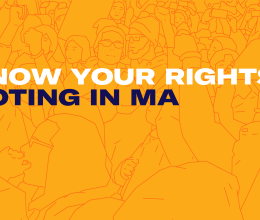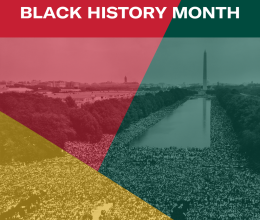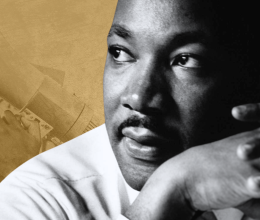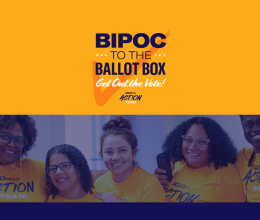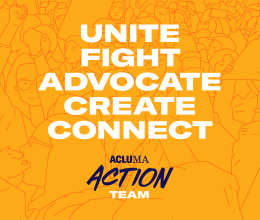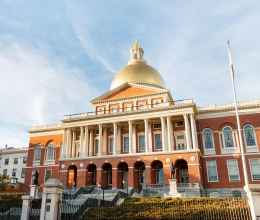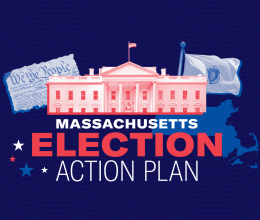
Photo: Members of the Massachusetts Election Modernization Coalition celebrate the option of early voting, available for the first time on October 24, 2016. Photo by Caley McGuane.
Voting is the cornerstone of our democracy and the fundamental right upon which all our civil liberties rest. But what happens when that cornerstone is under attack? Denying individuals access to the polls and creating barriers to participating in the electoral process are threats to the foundation of our nation. Fortunately, in Massachusetts we don't have those problems—or do we?
The 2013 Shelby v. Holder decision gutted the Voting Rights Act by eliminating the preclearance requirement, which provided protections against any changes to state and local voting laws or procedures. Since the Shelby decision, we've seen states like North Carolina, Texas and Alabama impose voting restrictions and strip away voter expansion initiatives. But Massachusetts is not included among the states that were previously covered by the VRA preclearance requirement—either in their entirety or at the county level. So we're good right?
Even putting aside Massachusetts' more nefarious not-too-distant past, we've got a lot of work to do to strengthen our democratic process and guarantee genuine ballot access for everyone. Our success should be measured by whether all eligible voters have unfettered access to the polls and can have a meaningful voting experience. In 2004, MassVOTE issued a report stating that anywhere between 100,000 and 200,000 voters potentially lost their votes because of inefficiencies in registration, voter misinformation or poorly trained poll workers.
In 2006, voters in Boston stood in line for hours only to find out many of their precincts had run out of ballots. The Secretary of the Commonwealth felt that, given the low turnout in Boston's predominately Black and Latino communities in past elections, there wasn't a need to fully stock the polls with ballots. Even when the first African American was running for governor.
Despite the fact that Massachusetts does not require photo identification to vote, so-called "voter integrity" groups sought to dissuade voters by suggesting they need to bring photo identification to the polls in 2011. One of these groups erected a billboard in a section of Southbridge that has a significant Latino population. Several months later in New Bedford, individuals set up a table inside of the polling location with a sign that instructed voters to show their identification to vote.
The 2012 elections saw significant voting irregularities at polling locations in Springfield, including closed polls, inaccurate voter lists and voters' receiving incorrect information about polling locations. We've even seen Latino voters intimidated recently at polling locations in Salem.
These incidents do not rise to the level of system-wide efforts at voter disenfranchisement like we've seen in other states. However, if we believe that voting is the cornerstone of our democracy, then every vote counts.
That's why the ACLU of Massachusetts is proud to partner with the Lawyers' Committee for Civil Rights and Economic Justice, Common Cause, MassVOTE, the League of Women Voters and the Anti-Defamation League as a part of the Election Protection coalition, the largest non-partisan voter protection initiative in the country. Over the last three presidential elections, our Massachusetts volunteers have assisted thousands of voters and secured people's right to vote. This election, we are seeking volunteers to serve as poll monitors to ensure voters are not inappropriately challenged, denied the right to vote or intimidated at the polls.
As with every election, ensuring access to the polls and reducing barriers to civic participation are extremely important goals. In addition to Election Protection, we celebrate all the Massachusetts cities and towns that have fully embraced early voting, which begins on Monday, October 24. By increasing access to the polls through early voting, we ensure that as many citizens as possible have a voice in the preservation and growth of our democracy. Communities with significant numbers of people of color, people living under the poverty threshold and English language learners, who have been historically underrepresented in electoral politics, will benefit the most from this very necessary modification of our voting practices.
Our efforts as part of the Massachusetts Election Modernization Coalition led to the passage of an election modernization bill—which among other thing—allows online registration, early voting, pre-registration for 16- and 17-year-olds and requires post-election audits. All of these advancements help increase access to the polls for all Massachusetts citizens.
But there is much work left to do. Midnight on Wednesday, October 19 is the last day to register for this election—a deadline that, if missed, would leave some potential voters out in the cold. Somebody should do something about that.
